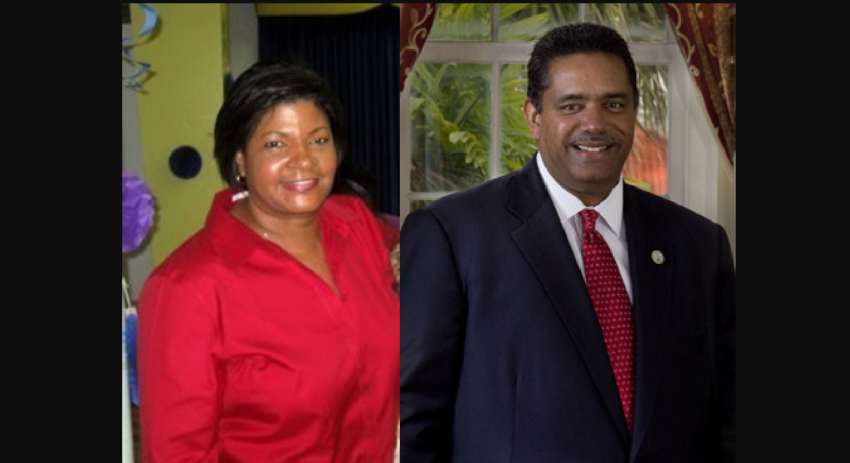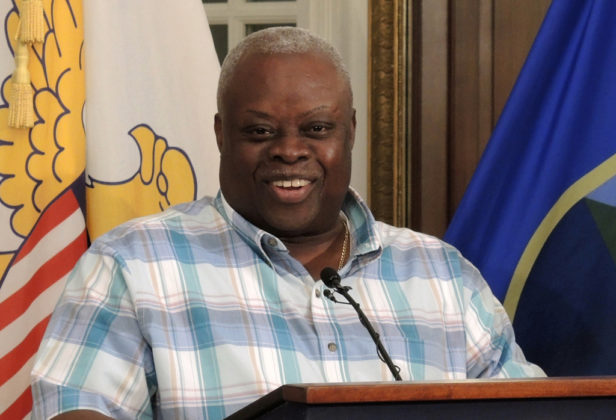CHARLOTTE AMALIE — A new lawsuit filed by five victims of Jeffrey Epstein contains bombshell allegations against the Virgin Islands government and officials like former Virgin Islands first lady Cecile Galiber-deJongh , who is accused of doing nothing while Epstein raped a woman in the next room, the Virgin Islands Daily News reports.
The victims’ lawsuit includes allegations about conduct that occurred between 2001 and 2019, nearly the entire two decades that Epstein lived in the Virgin Islands. Epstein died by suicide in a Manhattan jail cell in August 2019 while awaiting trial on new charges.
The lawsuit paints a grim picture of a territory sometimes referred to as “America’s Paradise,” where Epstein’s victims “would be removed from their families, friends, and loved ones and be completely isolated.”

Cecile Galiber-deJongh of St. Croix (left) and former Governor John P. deJongh Jr. of St. Thomas
According to the 37-page complaint filed Wednesday in U.S. District Court for the Southern District of New York, “Epstein did not act alone.”
In addition to Mrs. Galiber-deJongh and the Virgin Islands government, the list of defendants includes former governors John deJongh Jr. and Kenneth Ezra Mapp, former senators Celestino White Sr and Carlton Dowe, Virgin Islands Delegate to Congress Stacey Plaskett and former Virgin Islands Attorney General Vincent Frazer. There are also 100 unnamed “John Doe” defendants, including law enforcement officers who are accused of turning a blind eye to Epstein’s crimes.
The class-action lawsuit identifies the current plaintiffs as “Jane Doe” 1 through 5, and the victims are asking the court to proceed anonymously and use pseudonyms. The class “consists of dozens of women,” and the identities of other class members can be found in records maintained by Epstein’s estate, according to the lawsuit.
Much of the information in the new lawsuit was taken from depositions of Virgin Islands government officials during litigation that the Virgin Islands Justice Department initiated against JPMorgan Chase bank. In that complaint, the government said bank officials violated the Trafficking Victims Protection Act by failing to report Epstein’s suspiciously large cash transactions, which he was using to pay victims and others involved in the conspiracy, such as pilots and politicians.

Former Governor Kenneth Ezra Mapp of St. Croix.
The federal law allows victims to file suit “against any person who knowingly benefits,” from participating in a venture that they “knew or should have known violated the laws against sex trafficking.”
Government officials claimed that the lawsuit against JP Morgan was filed for the benefit of Epstein’s victims. But according to the new lawsuit filed by Epstein’s victims, the government’s complaint against JPMorgan ultimately exposed just how much Virgin Islands leaders were willing to assist a known sexual predator.
The defendants “actively and knowingly concealed” their actions for many years, and it wasn’t until the JPMorgan lawsuit “that the Plaintiffs and public learned of the many acts committed by Defendants,” according to the lawsuit.
“A number of those acts were committed by First Lady de Jongh, acting within the actual and apparent scope of her office to further USVI’s and Epstein’s interests,” according to the lawsuit.
Epstein employed deJongh as his long-time office manager. During her deposition in the JPMorgan case, deJongh claimed to have not known anything about Epstein’s crimes.
The new lawsuit says that’s not true. Around 2003 or 2004, “Epstein brought Jane Doe 4 to his office in Red Hook on St. Thomas,” according to the lawsuit.
Inside his office, Epstein “raped her over his desk. The brutal assault lasted about ten minutes,” according to the lawsuit.
When Epstein was finished, they left through a door “where defendant Cecile de Jongh was sitting. Given her proximity, de Jongh heard the sexual assault, yet she looked at Jane Doe 4, straight into her eyes from her desk and did nothing at that time or at any time afterwards,” according to the lawsuit. “Given her proximity, it would have been impossible for her to have not heard the sexual assault and yet she did nothing with that information at that time.”
With the help of the Virgin Islands government, Epstein built what was “by many accounts the most powerful and wealthiest sex-trafficking venture ever created,” according to the lawsuit, which accuses local leaders of negligence, and aiding and abetting Epstein’s crimes.
According to the victims’ lawsuit, the venture “had everything a sex-trafficking organization needed,” including funding and a place to operate “openly and without fear of interference or oversight, and complicit laws, employees, and government.”
All five victims were solicited by Epstein in New York, “and then transported from New York to the USVI and held captive and abused in the U.S. Virgin Islands at Epstein’s USVI estate,” according to the complaint.
The lawsuit accuses Virgin Islands officials of protecting Epstein in exchange for money and favors, even after he pleaded guilty to sexually abusing underage girls in Florida in 2008.
Epstein was ordered to register as a sex offender following his release from prison, but the complaint claims Virgin Islands government officials agreed to grant him special treatment so he could continue to travel freely with young women.
In exchange for their assistance, Epstein “gave payments, advice, and other benefits to the highest USVI government officials,” according to the lawsuit, which includes several incidents previously detailed in the JPMorgan case.
“On one occasion, when the USVI government was desperate for money, USVI officials affirmatively and directly solicited Epstein’s assistance. Epstein worked with both a sitting and former USVI Governor on a plan to secure cash by extending it a $50 million loan collateralized by USVI’s islands,” according to the complaint.
Mrs. Galiber-deJongh suggested Epstein “put Senator Celestino White on a monthly retainer to obtain government loyalty and access,” and directed payments from Epstein to political candidates, according to the complaint.
“Epstein also freely loaned the de Jongh family money,” after Governor deJongh was charged in 2015 with using $500,000 in public money for improvements to his private home, and deJongh resolved the case by paying a $380,000 settlement without admitting wrongdoing, “by successfully borrowing $215,000 from Epstein to pay the settlement,” according to the complaint.
Plaskett was deposed as part of the government’s lawsuit against JPMorgan, and was forced to admit that she had met privately with Epstein at his home in New York to ask him for money — information she had not previously shared with the public.
Before she ran for office, Plaskett served as the attorney for the V.I. Economic Development Commission, while Gov. Albert Bryan Jr. — who was EDC chairman at the time — and other members signed off on lucrative tax breaks for Epstein’s companies.
Bryan is not named as a defendant in the complaint.
After Epstein’s 2019 arrest, Plaskett publicly defended her decision to take campaign contributions from him, citing her personal “litmus test” that she said Epstein had passed, despite being a registered sex offender.
Plaskett initially said she would not return $8,100 she had received from Epstein. But as public pressure mounted, Plaskett reversed course and said she would instead donate an equivalent amount to the Women’s Coalition of St. Croix and the Family Resource Center on St. Thomas.
It wasn’t until her deposition in May that Plaskett admitted she had actually accepted a total of $30,000 in campaign contributions from Epstein and his employees.
Plaskett has declined several requests for comment and has not responded to questions from The Daily News about whether she has donated any of the $21,900 she received from Epstein’s associates.
Plaskett also has not responded to questions about whether her “litmus test” for receiving campaign contributions has changed, and if she would accept campaign contributions from other registered sex offenders.
Epstein donated widely to many politicians’ campaigns through his St. Thomas-based business, Southern Trust Company.
For example, Senator Donna Frett-Gregory said in July 2019 that Southern Trust’s EDC status gave her confidence in accepting the $1,000 contribution because “EDC companies go through a very rigorous vetting and investigative process before they are awarded benefits.”
In reality, the EDC vetting process relies heavily on companies to self-report information, and former Virgin Islands Attorney General Denise George later sued Epstein’s estate, claiming that Southern Trust was nothing more than a front for Epstein’s sex trafficking operation.
Despite having no discernable legitimate business operations in the territory, Epstein received tax benefits worth over $300 million from the EDC over the course of his lifetime, according to court records.
That figure had also been a closely-guarded government secret until the territory sued JPMorgan, and information about Epstein’s tax benefits came out in discovery.
The discovery process unearthed a wealth of documents, including emails between Epstein, Mrs. deJongh, and government officials willing to trade access for favors.
For example, Mapp “asked Epstein to assist him” in developing a way for EDC beneficiaries to avoid paying even more taxes, and “one of Epstein’s lawyers drafted proposed legislation for the governor,” according to the new lawsuit.
The lawsuit is claiming the V.I. government and other officials violated the Trafficking Victims Protection Act in a variety of ways, and failed to protect victims from abuse.
Some of the still-unidentified defendants were employed by the Virgin Islands government as police officers, but others are federal employees. For example, the lawsuit identifies some defendants “as USVI customs agents,” but customs agents are not under the control and supervision of the local government.
Still, the lawsuit claims that Epstein wielded influence so powerful, it extended even to federal employees. For example, he complained to Galiber-deJongh in a 2010 email about a U.S. Customs official who caused him “difficulty,” and Galiber-deJongh “promised that she would ensure this wouldn’t happen again by calling the head of customs,” according to the lawsuit.
As another example, “a USVI customs agent and/or border control worker was compensated by Epstein under the guise of playing Caribbean drums for him on his island.”
In addition, law enforcement in the Virgin Islands “never investigated Epstein, even after Florida law enforcement faxed Epstein’s sexual predator registration information to USVI Department of Justice officials in July 2010, with which they included a news article confirming his status as a sex offender,” according to the lawsuit.
The complaint includes a section that asks the court to enter judgment in favor of Epstein’s victims and “against Deutsch Bank.” That appears to be a typo, and is possibly language borrowed from a similar complaint filed by victims against the German bank, which took Epstein on as a client after he was dropped by JPMorgan Chase.
That lawsuit was recently settled for $75 million, 30% of which will go to pay lawyers representing the victims.
Attorneys representing the victims in the case against the Virgin Islands government include Jordan Merson, Annette Hasapidis, Jordan Rutsky, and Kimberly Kramer.
Government House Communications Director Richard Motta Jr., Justice Department spokeswoman Sandra Goomansingh, and Plaskett’s spokeswoman Tionee Scotland have not yet responded to requests for comment from The Daily News.
By SUZANNE CARLSON/Virgin Islands Daily News

